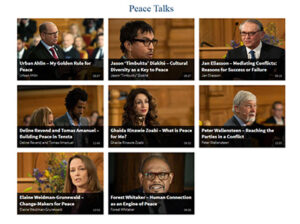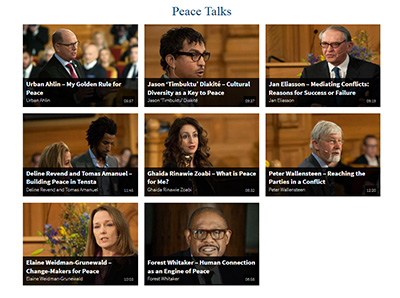25 February 2015 – With the Peace Talks going global, the Swedish Parliament and Interpeace co-organized the first-ever Stockholm Peace Talks in the prestigious Swedish Parliament Buildings. This event brought together renowned speakers from diverse backgrounds from Sweden and abroad, including from the United Nations, government, business, the arts, and civil society.
Moderated by Swedish journalist Willy Silberstein, and attended by HRH the Crown Princess Victoria of Sweden, the Stockholm Peace Talks involved a succession of eight speakers, who explained what peace means to them, and shared their experiences so as to inspire reflection on how each and every one of us has a role to play in promoting peace.
 |
An inspiring and varied line-up Amongst the distinguished speakers was the Speaker of the Parliament and co-organizer of the event, Urban Ahlin, who launched the evening by reminding the audience of the growing interdependence of the world, and defining peace as a golden rule, according to which “one must treat others as one wants to be treated oneself.” Ghaida Rinawie Zoabi, Executive Director of the Injaz Center for Professional Arab Local Governance, succeeded the Speaker of Parliament, and explained that her experience as a peacebuilder has shown her that “there is a future for both worlds.”
Professor of Peace and Conflict Studies at Uppsala University, Peter Wallensteen brought both a note of alarm and one of hope, declaring that while “2014 saw ten wars, the highest number in the 21st century”, it also saw the end of 120 conflicts. He also suggested new avenues to explore for peacebuilding, mainly in the world of academia, indicating that “universities can offer a brainstorming arena for confidence-building between [conflicting] parties.”
Jan Eliasson, Deputy Secretary-General of the United Nations, also spoke at the Stockholm Peace Talks, and introduced a new dimension to the evening. He linked peace to the respect of human rights, a greater cultural sensitivity and the need to build lasting trust, and concluded the first half of the evening with the notable statement that “peace is not about ending war, [but] about preventing war from breaking out.”
The second half of the Stockholm Peace Talks began with Elaine Weidman-Grunewald, Vice President of Sustainibility and Corporate Responsibility for the Ericsson Group, who examined the role that can be played by both the networked society and the corporate world in seizing the “unprecedented opportunity to work for peace and create a culture of inclusion.”
The event also featured a video from Forest Whitaker, artist, founder and CEO of the Whitaker Peace & Development Initiative, and UNESCO Special Envoy for Peace and Reconciliation, to whom “peace is not only the absence of bad things, [but] also the presence of good [ones]”. Mr. Whitaker concluded his talk with the inspiring plea that “we must be united in purpose to build the fire of peace [and which] every one of us can contribute [to].”
Jason “Timbuktu” Diakité, a prominent Swedish musician, shared a touching story from his past to illustrate the idea that “peace is not something to be taken for granted even if [you] live in a country that has a lot of it”. Throughout his talk, he pointed out the key role played by cultural diversity, issuing a warning that “fear [of the other] is a formidable adversary of peace.”
The final speakers of the Stockholm Peace Talks were two young facilitators from the Stockholm-suburb Tensta, Deline Revend and Tomas Amanuel. Setting a striking example of the crucial role that youth can play in peacebuilding, they called for society to “give people a second chance, to forgive each other and move on” as the key to building a lasting peace.
A message of hope closes the Stockholm Peace Talks
Tord Magnuson, Chair of Interpeace Sweden, and Scott M. Weber, Director-General of Interpeace closed the Stockholm Peace Talks, with a final assertion that “everyone has a role to play in building peace [so as to prevent] exclusion [from] eroding trust in our societies”.
Lastly, the Stockholm Peace Talks were marked by the innovative addition of musical interludes, featuring Adam Tensta, one of Stockholm’s most renowned rappers, and Swedish R&B and jazz singer LaGaylia Frazier, who marked the end of the event. Videos of the individual speakers of the Stockholm Peace Talks are now available online.
About the Peace Talks The Peace Talks began in 2013 with the first-ever Geneva Peace Talks co-organized by the United Nations Office at Geneva, Interpeace and the Geneva Peacebuilding Platform. Rooted in the conviction that each and every person has a role to play in peace, the goal of the Peace Talks is to expand the space for dialogue about building peace and resolving conflict.
While the Geneva Peace Talks remains the flagship event, the Peace Talks is now being rolled out in different parts of the world.
